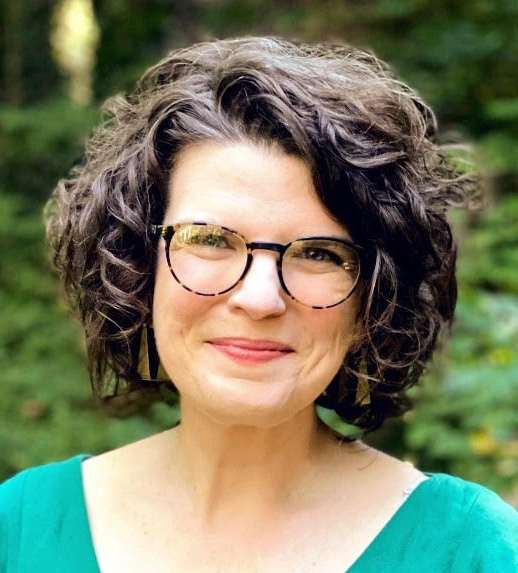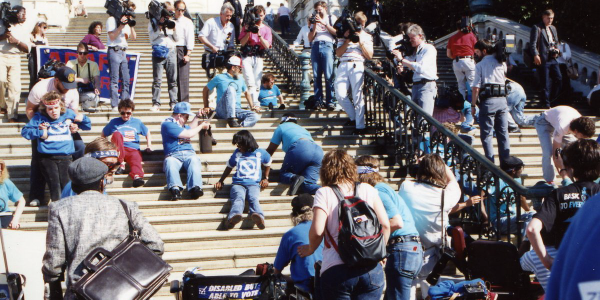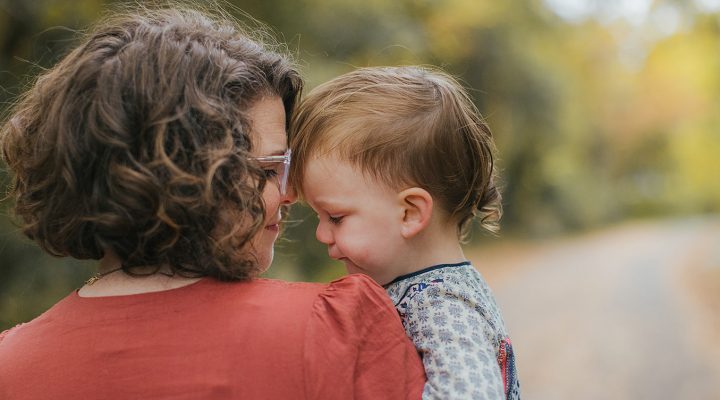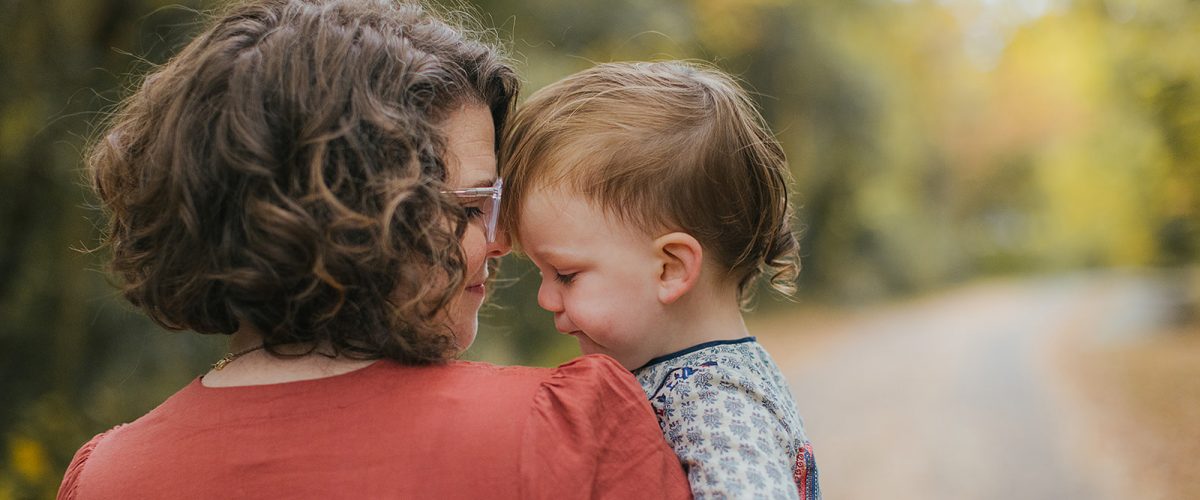Three years ago today, when the pandemic hit, I was barely shy of nine months pregnant. We knew our daughter, George, would be born with Turner Syndrome. She faced open heart surgery at a day old in April 2020, a GI surgery in June 2020 and two heart catheterizations in September 2020.
Her first year of life held more than 100 medical appointments. Not only is George medically complex, but I’m immunocompromised due to systemic lupus, too. Early on, when people talked about “staying home to protect the most vulnerable,” they meant our family.
Three years later, we’re still the ones masking indoors in public and asking folks to meet us for coffees, drinks and dinners outside — no matter the weather. While many say we’re “post pandemic,” our family, and many like ours, must continue to calculate any and all inside, unmasked interactions, weighing the risk vs. reward.

Molly Brummett Wudel
George turns 3 in six weeks. As she grows, she takes in the world with a deep curiosity, figuring out how things and people work. She immerses herself in stories we read as well as stories her father and I tell. As she turns 3, and for all the years after, what is the story I want to tell her about her life as a vulnerable, medically complex pandemic baby and now child? What is honest and true?
I first want to tell her how deeply loved she is. I’ll tell her about the hundreds upon hundreds of people, scattered across this globe, who held her, her parents and her medical team in the deepest love, light and care as she came to this earth and continues to stay earth side, beating ridiculous odds.
I’ll whisper in her ear Cameron Wiggins Bellm’s prayer, “May we who are merely inconvenienced remember those whose lives are at stake. May we who have no risk factors remember those most vulnerable,” and tell her how early on in the pandemic, when many prayed this prayer, they actively remembered and prayed for our family.
I’ll comfort her and share that we are not where we were in March 2020. For a season, people really did stay home to save lives. Science is miraculous, vaccines remarkable, and we can leave our house for church, school and playdates and feel safer because we have tools to help us — like masks inside and bi-valent boosters.
I’ll tear up when sharing about her church community, Emmaus Way, who let her mom take an extended leave as pastor in 2020 to care for George, the most vulnerable. I’ll tell her how we committed to worshiping outside through fall of 2021 — even when that meant being outside on a hideous parking lot, and how we required masks inside until September 2022 to keep the most vulnerable, disabled bodies safe. I’ll share about how even now her church is not afraid to put the masks back on when community spread is high and did so this past January.
But I’ll also be honest about how the universal church and broader society, intentionally or not, in the pandemic and decades before, cared less for vulnerable, disabled bodies — bodies like hers and her momma’s.

Capitol Crawl, 1990
I’ll then go further back in history, 30 years prior to the world shutting down, to March 12, 1990, when more than 1,000 protesters came to Washington, D.C., at a pinnacle moment, now known as the Capitol Crawl, in the struggle to pass the Americans with Disabilities Act, a bill aimed to end segregation and “separate but equal” realities for disabled persons. That day, more than 60 disabled activists abandoned their mobility aids and began to climb, crawl and edge up the steps to the top of the west Capitol. Some climbing on their own and some climbing with help from friends and family, they were cheered on by allies, onlookers and the press.
Together, the march and the crawl comprised one of the largest disability direct actions to date, and this direct action forced Congress to see disabled bodies, the lack of care and support for the vulnerable, and spurred congress to finally pass the ADA.
But I’ll also tell her how even now, the ADA is not a reality in all places, segregating disabled bodies still happens, and even 30 years after the Capitol Crawl, disabled, vulnerable bodies were and are more likely to die of COVID-19 than their able-bodied counterparts due, in large part, to systemic injustices held up by an “able-bodied” society.
I’ll then nuzzle close and name how it is often still easier for the world and the church, no matter where they fall across the theological and ideological spectrum, to get to a point of exhaustion and act as though vulnerable, disabled bodies are more integrated and safe than they are. Rather than fighting for full, accessible inclusion, churches and people of faith throughout history too often settle for inadequate welcome, including in the pandemic.
“Rather than fighting for full, accessible inclusion, churches and people of faith throughout history too often settle for inadequate welcome, including in the pandemic.”
I’ll tell her that while churches preach of collective care and a God who widens the circle for all to be fully welcome, churches sometimes act in unintentional, painful ways that reveal how we are not caring for the most vulnerable, disabled among us but rather caring for able-bodied comfortability.
But then I’ll bring her even closer, look deep in her eyes, and share stories about particular disabled, vulnerable bodies, God’s beloveds, who are just as sacred, whole and holy as any able-bodied person — Ed, Judy, Kate, Haywood, Stephanie, Chris, Ruth, Kieran, Fiona, Jennifer, Sophia, River, Emerson, James and George.
Once George is over story time, over hearing her mom tell this story March after March, I’ll slowly envelope her in the biggest hug. I will look deep into her bluest, glimmering eyes and emphatically remind her that she is created, held and loved by a God who took on flesh as a radical rabbi from Nazareth who intimately knew a vulnerable, suffering, disabled body, a God who does not cast aside the other or prioritize ability over disability, a God whose kin-dom vision does not proclaim “post pandemic” until all of God’s children can move through the world with inclusive care and affirmation that all bodies bear the imago Dei and have a God-given right to be included, safe and whole.
Molly Brummett Wudel has been pastor at Emmaus Way, a quirky, progressive, ecumenical community, in Durham, N.C., since 2015. When she isn’t co-pastoring, writing or organizing, she and her spouse, James, attempt to keep up with their very active, young child, George Eden, and their less active, old pup, Greta.
Related articles:
We need to remember the scars of our trauma in a post-pandemic world | Analysis by Laura Ellis


